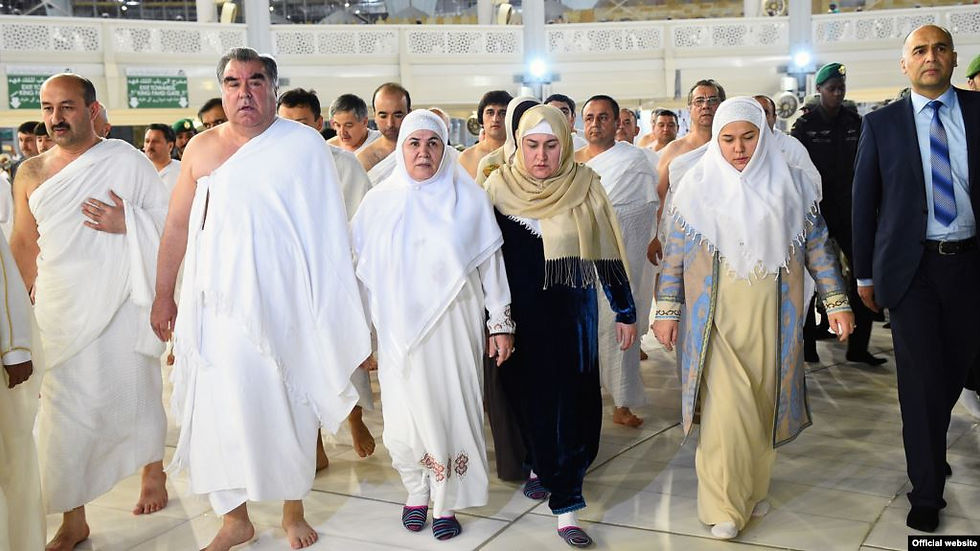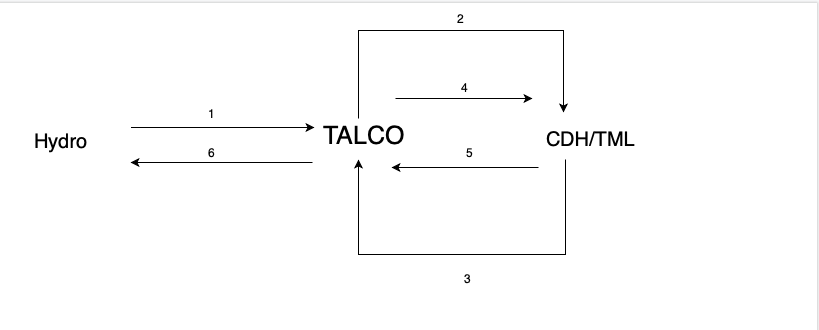The Family Run State
- centralasiareview
- Dec 5, 2019
- 7 min read
Updated: Dec 15, 2019
Whilst Tajikistan is one of the most impoverished states in the world, the Rahmons, Tajikistan’s presidential family, are doing extraordinarily well. The president, Emomali Rahmon, has placed members of his own family and their close relatives to hold powerful positions and together they use their political power to extract profits from state-owned enterprises and projects. The inner-circle uses a variety of offshore instruments that allow them to discreetly move money from Tajikistan to offshore havens in the British Virgin Islands. This article will trace back the creation of the Rahmon inner circle and identify its key members. Subsequently, two case studies will exemplify how the president’s inner circle covertly uses offshore jurisdictions to and amass stolen proceeds abroad.
The Patron and his Family
Shortly before the disintegration of the Soviet Union, Rahmon became the the Chairman of the Tajik SSR and remained a powerful force in Tajik politics in the first months after the country became independent (Carnegie Endowment for International Peace, 2012). He officially became president in 1994 after Tajikistan’s first president, Rahman Nabiyev, was ousted out by the islamic opposition. Backed by Russia, Rahmon managed to take advantage of the power vacuum and throughout the Tajik Civil War, his presidency was defined by his fight against the United Tajik Opposition (UTO) out of which he emerged victorious. The Civil War officially ended in 1997 with a UN-backed peace treaty between Rahmon and the Islamic Opposition, however the incumbent remained in charge. In the years following the peace treaty, Rahmon has diminished the UTO’s political power and subsequently strengthened his position as president of Tajikistan, eventually earning himself an official title of Tajikistan's “Founder of Peace and National Unity” (ibid). Henry Hale’s theory of patronal politics finds its practice in Tajikistan. Patronal politics occurs in the instance when individuals concentrate their political and economic efforts around “the personalized exchange of concrete rewards and punishments through chains of actual acquaintance” (Magyar & Malddovics, n.d, p.39). Magyar and Maldovics argue that the Tajik system is a “single pyramid” which sees president Rahmon at the top of the structure, controlling the dynamics below him (p.330). Members of the pyramid are bound by informal rules, absolute loyalty to the leader and characterised by detachment from the general electorate. Especially in the Tajik context, family relationships are usually intertwined with being part of the power pyramid. His oldest Daughter, Ozaoda, is the head of Tajikistan’s executive office. His third daughter, Rukhshona, works as the Deputy Head for International Organizations in the Foreign Ministry, whereas his son, Rustam, who previously held the position of Tajikistan’s head of the State Customs Service is currently the mayor of Dushanbe, the capital city of Tajikistan (Radio Free Europe, 2019). Rahmon’s in-laws have also been placed in powerful posts. His brother in law, Hasan, heads Orien Bank- one of the largest commercial banks in the country, whereas his son in law, Jamaluddin (Ozoda’s husband) is a powerful deputy head of the National Bank. Both are thought to have used their powerful positions in finance to construct the families network of offshore accounts.

The Rahmons / Source: Radio Free Europe
TALCO
Talco is the single dominant asset in Tajikistan and the countries largest exporter. Figures from 2013 show that TALCO’s exports are worth 20% of Tajikistan’s GDP and constitute 60% of the countries exports (Heathershaw & Herzing, 2013). President Rahmon and his brother in law, Hasan Sadullayev, first took control of TALCO in 2005 after ousting out the previous heads Azar Nazarov and Abdulkadir Ermatov. Although on paper the company is state-owned, the management of its crucial trading wing had been outsourced to two offshore companies- Talco Management Limited and CDH, both of which are registered in the British Virgin Islands and officially have no clear beneficiaries (Hryniuk, 2018). CDH and TML were “cut-out” companies which were designed to conceal the beneficiary owners of the tolling scheme and reduce the tax burden these beneficiaries would have overwise carried. Documents revealed in the legal dispute between TALCO and its former management (noteworthy, the most expensive court proceeding in British legal history) show that after Rahmon and Sadullayev took control, the company became party to an unprofitable tolling scheme which benefited TALCO’s Norwegian partner, Hydro and the two aforementioned trading companies. A diagram below shows the tolling arrangement worked to TALCO’s disadvantage.

Diagram composed by the author of this article, based on Cooley and Heathershaw, 2017 and Heathershaw and Herzing, 2013
1. Based on a partnership contract, Hydro sends TALCO raw materials for processing.
2. The smelter (TALCO) outsources the management of the raw materials to CDH/TML.
3. CDH, in turn, contracts TALCO to process the raw materials into aluminium.
4. Based on a presidential decree issued on December 23rd 2004, aluminium is transferred back to CDH/TML without cost.
5. CDH/TML sell the aluminium back to TALCO at a market price.
6. TALCO sells the aluminum to Hydro at a premium price (thus operating at a loss).
Throughout legal disputes, both Hydro and TALCO refused to name the beneficiaries of CDH/TML. Officially, the litigation could not reveal the beneficiaries of CDH and TML, however, it is symptomatic that despite having direct control of the company and having the power to reveal details about the tolling scheme, president Rahmon decided to maintain his covertness. Cooley and Heathershaw calculate that between 2005 and 2007 TALCO made only a $15 million profit, in conditions where the price of aluminum increased over 200%. Throughout that period, it is estimated that the Tajik giant lost $1.145bn, meanwhile, CDH and TML made a profit of $500m (Helmer, 2007).
The TALCO case shows that Tajikistan operates in a similar way to other Central Asian states. Local arrangements, rivalries and connections are intertwined with the global, multi-million contracts and court settlements. On one hand, ousting Nazarov and his partner was an internal, Tajik struggle, but on the other, its settlement took place in courtroom at the Old Bailey and cost millions of pounds. Similarly, to funnel money abroad, Rahmon and his allies use a mixture of domestic instruments, such as passing decrees to give away state capital, and distant, offshore accounts to keep illicit proceeds. The relationship between the local narratives and global instruments is what defines governance in Tajikistan and what allows president Rahmon and his family to benefit from state resources.
Innovative Road Solutions
As part of China’s Belt and Road Initiative, the Tajik government was loaned almost $300m by the Chinese government to construct a highway between Tajikistan's two largest cities- Dushanbe and Chanak (Toktomushev, 2018). Since Tajikistan’s independence, tolling roads were forbidden in Tajikistan, however, not long before the completion of the highway, the Tajik parliament had passed a new bill that allowed tolling roads to operate within Tajikistan. This change in legislation allowed a third-party contractor, Innovative Road Solutions (IRS), to install tolling stations on the new highway and extract excruciatingly high fees from local drivers. In a rare occurance of protest, ten thousand people signed a petition to the president asking him to revert the instalation of tolling stations on the highway, however, neither the government, nor the president responded. Instead, information appeared that IRS was registered in the British Virgin Islands and its ownership, according to government ministers, was a trade secret (Eurasianet, 2010). Only an investigation by Deutsche Welle revealed that the company was actually owned by none other, but the president’s son in law, Jamoliddin Nuraliev (DW.com, 2010). Further investigation discovered that IRS was exempt from all forms of taxation, had not previously been known for these types of projects and, despite previous governmental statements, there was no public tender for the construction of the project (ibid).

Jamoliddin Nuraliev/ Source: Raymnon.net
In a public spectacle, the Tajik Competition Authority (a state organ which reports directly to the president) began investigating IRS’s operations. In his findings, the head of the investigation, Amonullo Ashur deemed that IRS was in fact operating illegally and threatened to take the case to Tajikistan’s high economic court (Eurasianet,2010). Before that could happen, a “specialist parliamentary committee” mainly consisting of close allies of president Rahmon and his family reverted the previous verdict and allowed the company to continue collecting toll fees, at the same time classifying the entire IRS contract as a state secret and firing Ashura from the Competition Authority.
The case of Innovative Road Solutions is similar to the TALCO case in a number of ways. As in the TALCO case, the president had the power to uncover who the beneficiary owner of IRS is, but, instead, further classified the details of the deals, including the identites of the offshore account beneficieries. Similarly to TALCO, the IRS has an international dimension to it, with an enigmatic scheme of offshore accounts which diverted stolen proceeds away from Tajik tax authorities and placed them instead in the BVI's. Symptomatically, the IRS case also shows another dimension of Tajik politics- the blurring line between formal governance and informal relationships. Not many children-in law have as great relationships with their parents in-law as Nuraliev and Rahmon have. It remains unclear why the “specialist parliamentary committee” did not see eye to eye with the competition authority, nor is it understood how can a beneficiary owner of a state contractor be classified as a trade secret. What is known is that Rahmon's children, their spouses and individuals close to the family all benefit from powerful positions and lack of real transparency. Behind the scenes of formal rules and institutions takes place an entirely kavquesqe reality, where only a privileged inner-circle understand the actual rules that govern Tajikistan.
When the Formal Becomes Informal, When the Local Becomes Global
This article sought to expose how governance, family and globalisation interplay in Tajikistan. The combination of formal rules and institutions with the informal, kinship connections between Rahmon and his inner circle show that governance in Tajikistan rests in the hands of one family. The local relationships are inedvertibly nourished by offshore tax havens, allowing the Rahmons to safely keep their illicit proceeds away from public view and enjoy the discretion they currently have. Governance in Tajikistan is an enigmatic and confusing combination, where the formal is governed by the informal and where the local becomes global.
Bibliography:
Carnegie Endowment for International Peace. (2019). Background on Emomali Rahmon. [online] Available at: https://carnegieendowment.org/2012/09/10/background-on-emomali-rahmon-pub-49324 [Accessed 1 Dec. 2019].
Cooley, A. and Heathershaw, J. (2019). DICTATORS WITHOUT BORDERS. [Place of publication not identified]: YALE University Press, pp.91-119.
Helmer, J. (2019). GREAT POWER GAMES, TALCO & THE TAJIKISTAN ALUMINIUM CORRUPTION PROGRAM. [online] Dances With Bears. Available at: http://johnhelmer.net/great-power-games-talco-the-tajikistan-aluminium-corruption-program/ [Accessed 1 Dec. 2019].
Heathershaw, J. and Herzig, E. (2013). The transformation of Tajikistan. Routledge, pp.120-125.
Hryniuk, O. (2019). The enduring saga of Tajikistan’s TALCO dispute: CIS Arbitration Forum – Online Journal about Dispute Resolution in Russia, Ukraine, Kazakhstan, Belarus and the Region. [online] Cisarbitration.com. Available at: http://www.cisarbitration.com/2018/01/15/the-enduring-saga-of-tajikistans-talco-dispute/ [Accessed 1 Dec. 2019].
Magyar, B. and Maldovics, B. (n.d.). The Anatomy of Post-Communist Regimes. 1st ed. pp.39-45.
Radio Free Europe. (2019). The Happiest Member Of The Rahmon Family. [online] Available at: https://www.rferl.org/a/qishloq-ovozi-happy-tajik-family/29032252.html [Accessed 1 Dec. 2019].
Toktomushev, K (2018) “One Belt, One Road: A New Source of Rent for Ruling Elites in Central Asia?” in Laruelle, M. (2018) “China’s Belt and Road Initiative and its Impact In Central Asia” George Washington University.
DW.COM. (2010). Платные дороги в Таджикистане сделали государственной тайной | DW | 06.07.2010. [online] Available at: https://www.dw.com/ru/платные-дороги-в-таджикистане-сделали-государственной-тайной/a-5762913 [Accessed 1 Dec. 2019].
Фергана.Ру. (2010). Таджикистан: «Дорога Единства» обходится слишком дорого. [online] Available at: https://www.fergananews.com/articles/6597 [Accessed 7 Dec. 2019].

Comments